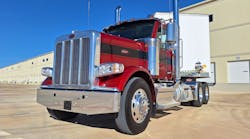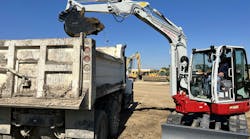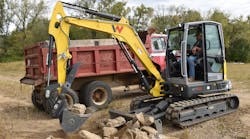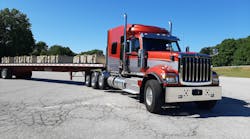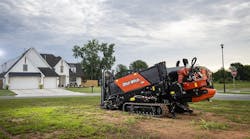Asphalt pavers (wheeled and tracked) with operating weights between 10,000 and 19,000 pounds are most in their element when paving parking lots, driveways, tennis courts and recreational paths. That's why they're typically called “commercial” pavers. We hasten to add, however, that some machines in this size class are quite capable of also paving city streets and county roads. And, although the market for these versatile machines has diminished in recent years, today's buyers nonetheless still have a relatively broad selection of models — many with features perhaps unexpected in small machines.
The market for commercial pavers has, in fact, dropped by some 50 percent from a high-water sales mark of about 1,800 units in 2005, primarily because the construction of new houses has slowed so drastically in the past two years.
“The market is difficult,” says John Hood, Bomag's manager of product development and sales for milling and paving products. “These machines are tied almost directly to housing and commercial development, and while they're also used by municipalities and counties for roads, the bulk of their work is subdivision streets, large parking lots and driveways.”
The diminished market for pavers in the 10,000- to 19,000-pound category is being sustained in the present lagging economy, says Hood, by contractors who still have work but have pushed their machines as far as they dare. Lack of work also means that many machines are simply lasting longer and thus interrupting the contractor's normal replacement cycle, which typically ranges from about five to seven years.
Despite the down market, manufacturers of small pavers have nonetheless continued with product development and refinement. For example, according to Brodie Hutchins, general manger of Vogele America, fairly recent innovations in the small-paver industry include electrically heated screeds and the integration of grade and slope controls.
Bomag's Hood adds to the list, saying that a common technical advance in commercial pavers is the replacement of manual control systems with electric-over-hydraulic systems. The overall result, he says, is ease of operation and more precise placement of material.
In some instances, says Hutchins, paver models in the 10,000- to 19,000-pound category have features that make them “highway-class pavers in a versatile commercial package.” He uses the Vogele Super 700 to illustrate:
“The Super 700's conveyor system can be rebuilt, the frame is robust, and the feed system is a highway-class design — even though the machine is less than 4 feet wide. The electrically heated screed extends hydraulically to nearly 7 feet, and with bolt-on extensions, to more than 10 feet. And it's versatile enough to pave down to 20 inches with optional cut-off shoes.”
At the large end of the 10,000- to 19,000-pound class are pavers capable of doing not only commercial work, but also roadway paving.
The 80-horsepower Mauldin 1750-C, for example, weighing 15,700 pounds, can place mats to 16 feet wide. The machine features an ultra-sonic material-feed system and can adjust the attack angle on screed extensions. Larger LeeBoy models, such as the 8515 and 8510, also are street-capable and feature 87-horsepower Kubota diesel engines, sonic auger controls, high/low deck configuration and electric-screed options.
Also in this larger class are the Bomag BF814 and BF815, capable of paving widths of 14 and 15 feet, respectively. The machines feature load-sensing hydraulic systems and 85-horsepower Cummins diesel engines.
Obviously not all commercial paving contractors need the capability of these larger units. For those involved primarily in basic paving and patching work — and interested in keeping equipment costs and operating expenses to a minimum — smaller, highly maneuverable machines are the most economical choices.
These machines may have a conveyor-type material-feed system or, as with machines such as Gehl's 1648 Power Box, the Bomag 3313, Leeboy 1000F and the Puckett 580, a gravity-type material-feed system. In either instance, conveyor- or gravity-feed, manufacturers have not neglected product refinement.
For instance, the Puckett 580, introduced two years ago and weighing just 10,000 pounds, has hydraulically folding hopper wings, electric-over-hydraulic switches for the augers, an 8-foot screed that hydraulically extends to 13 feet, and a 38-horsepower Kubota diesel engine.
“We want the machine to be easy to use,” says Paul Puckett, a principal in the company, “but we also recognize that we must keep the price down to appeal to cost-conscious buyers. Our machines don't have many bells and whistles [the screed is exhaust-heated, for example, with a propane option], but we invest in features to make them reliable and operator friendly.
A big technical challenge ahead for small commercial pavers, says Bomag's Hood, is bringing them into compliance with Tier IV emissions regulations. The size constraints of these machines, he says, makes installing diesel particulate filters and NOx catalysts extremely challenging — plus, the technology adds cost to an already-price-sensitive machine.
For contractors using these machines, the challenge ahead is finding work and, says Puckett, controlling overhead costs. According to Hood, the economy is forcing the more enterprising of these contractors to consider new possibilities.
“We see a growing number of small commercial paving contractors buying small milling machines to do maintenance work to sustain themselves or even to grow,” says Hood. “They're also branching off into other areas like seal coating and full-blown patch work. They're looking to expand their range of services and their customer base.”
John Rau, product training specialist for Gehl, also sees small contractors pushing their businesses in new directions. He cites one Gehl paver customer who recently purchased a cold planer and a powered hopper broom as attachments for his skid-steer loader, with the intent of taking on serious patching work.
The niche of small asphalt pavers, says Hood, is not production, as in placing tons and tons of material per hour, but is rather the competent placement of asphalt in a highly maneuverable fashion. Today's small pavers are still meeting that basic requirement, but are doing so more precisely and more economically than ever before.
